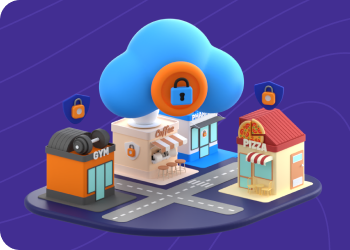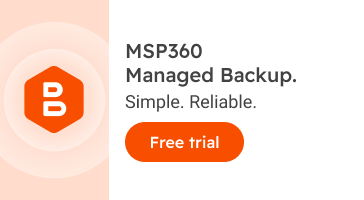Why Data Backup Matters for Small Businesses
In today's digital age, data is the backbone of virtually every business operation. From customer records and financial transactions to intellectual property and sensitive corporate information, data plays a pivotal role in decision-making, customer service, and overall business success.
For small businesses, in particular, data is a valuable asset that cannot be overestimated. This article explores why data backup matters significantly for small businesses and the potential consequences of neglecting this critical aspect of data management.
The Vulnerability of Small Businesses
Small businesses are often perceived as less attractive targets for cybercriminals than their larger counterparts. While it's true that big corporations may offer more extensive opportunities for cyberattacks, small businesses are far from immune. They are particularly vulnerable for several reasons:
- Limited Resources: Small businesses typically have fewer financial and IT resources for cybersecurity measures, making them easier targets.
- Lack of Awareness: Many small-business owners need to pay more attention to the importance of data backup and cybersecurity, assuming they won't be targeted.
- High Stakes: Data loss can be devastating for small businesses. Unlike larger enterprises with more extensive resources to recover, a significant data loss incident can cripple a small business or even lead to closure.
The Consequences of Data Loss
The consequences of data loss for small businesses can be severe and multifaceted:
- Financial Loss: Data loss can result in substantial financial losses, including the cost of data recovery (if possible), lost sales opportunities, and legal expenses.
- Damage to Reputation: Customers and clients expect their data to be handled securely. A data breach can damage a small business's reputation and erode trust.
- Legal Ramifications: Depending on the data lost, small businesses may face legal consequences, including fines and lawsuits for non-compliance with data protection regulations.
- Operational Disruption: Data loss can disrupt day-to-day operations, leading to downtime, missed deadlines, and reduced productivity.
The Role of Data Backup
Data backup is the practice of regularly creating copies of your important data and storing them securely. It is a foundational element of data management and an essential safeguard against data loss. Here's why data backup matters for small businesses:
- Data Recovery: In the event of data loss due to hardware failure, cyberattacks, or human error, having a reliable data backup ensures that you can quickly recover lost data and resume business operations.
- Business Continuity: Effective data backup strategies contribute to business continuity. Small businesses can continue serving their customers and clients even in the face of data disasters.
- Data Integrity: Data backups help maintain data integrity by preserving a copy of the original data in its pristine state. This is crucial for regulatory compliance and ensuring the accuracy of business records.
- Competitive Advantage: Small businesses prioritizing data backup demonstrate their commitment to data security and gain a competitive advantage by instilling trust in their customers.
Types of Data Backup
When it comes to data backup, small businesses have several options to choose from. Each type of data backup method has its own set of advantages and disadvantages, making it important to understand the differences and select the one that best suits your business needs. In this section, we will explore the various types of data backup strategies available for small businesses.
- Full Backup: A full backup involves creating a complete copy of all your data, including files, databases, and applications. While this method ensures comprehensive data recovery, it can be time-consuming and resource-intensive. Small businesses often perform full backups periodically, such as weekly or monthly, to ensure they have a complete data snapshot.
- Incremental Backup: Incremental backups are more efficient regarding time and storage space. These backups capture only the changes made since the last backup, whether it's a full backup or a previous incremental backup. While they save time and storage, restoring data may require multiple backups to be pieced together, which can be more complex.
- Differential Backup: Differential backups, similar to incremental backups, capture changes since the last full backup. However, they differ in accumulating all changes since the last full backup, not just the changes since the previous backup. This approach simplifies the data restoration process compared to incremental backups but may require more storage than incremental backups.
- Mirror Backup: Mirror backups involve creating an exact copy of your data in real time or near real time. This method ensures that you always have an up-to-date replica of your data. However, it can be resource-intensive, especially for larger datasets, and may only be suitable for some small businesses due to storage costs.
- Cloud Backup: Cloud backup, or online backup, involves storing your data on remote servers hosted by a third-party provider. It offers the advantages of accessibility, scalability, and disaster recovery preparedness. Small businesses can benefit from cloud backup services, which automate backups and provide secure off-site storage.
- Local Backup: Local backups are performed on on-site storage devices, such as external hard drives, network-attached storage (NAS) devices, or dedicated backup servers. They offer fast backup and recovery speeds but may not provide the same disaster recovery protection as off-site backups.
- Hybrid Backup: A hybrid backup strategy combines local and cloud backups. This approach leverages the speed and convenience of local backups for quick access to data and the security and redundancy of cloud backups for disaster recovery. Small businesses can enjoy the best of both worlds, ensuring data availability and security.
- Snapshot Backup: Snapshot backups capture a point-in-time image of your data, allowing you to roll back to a specific state if data corruption or errors occur. This method is often used in virtualized environments and can minimize data loss during failures.
Further reading Backup Types Comparison
Creating a Data Backup Plan
Creating a data backup plan is a crucial step for small businesses to safeguard their valuable data effectively. With a well-thought-out plan, you can avoid data loss, which can have severe consequences for your operations. In this section, we will guide you through creating a comprehensive data backup plan tailored to your specific business requirements.
- Identify Critical Data: Begin by identifying the data that is critical to your business operations. This includes customer records, financial data, intellectual property, and any other information that, if lost, could severely impact your business. Categorize your data based on its importance and sensitivity.
- Determine Backup Frequency: Different data types may require different backup frequencies. For critical data, you should perform backups daily or even in real time, while less-critical data can be backed up less frequently. Assess your data's update frequency and set backup schedules accordingly.
- Choose Backup Locations: Decide where to store your backup data. Standard options include on-site storage (external hard drives or network-attached storage devices) and off-site storage (cloud-based solutions or remote servers). Consider the advantages and disadvantages of each option and choose a combination that suits your needs.
- Select Backup Software and Tools: Choose backup software and tools that align with your backup plan. Look for features such as automation, encryption, and versioning. Make sure the selected tools are compatible with your chosen backup locations.
- Define Backup Procedures: Establish clear procedures for performing backups. Define who is responsible for conducting backups, how often they occur, and what data should be included. Document these procedures to ensure consistency and ease of implementation.
- Test Backup and Recovery Processes: Regularly test your backup and recovery processes to ensure they work as expected. This includes restoring data from backups to verify that the data is intact and accessible. Testing helps identify potential issues and allows for adjustments before a data loss event occurs.
- Implement Security Measures: Data security is paramount. Ensure that your backup data is encrypted, during both transmission and storage. Implement access controls and authentication measures to prevent unauthorized access to your backups.
- Monitor and Maintain: Continuous monitoring of your backup systems is essential. Regularly review backup logs and reports to detect any anomalies or issues. Ensure that your backup software and hardware are updated with the latest patches and updates.
- Document Your Plan: Document your data backup plan comprehensively. Include all the details of your plan, such as backup schedules, procedures, contact information, and recovery steps. This documentation serves as a valuable resource for your team in case of emergencies.
- Review and Revise: Data backup plans should not be set in stone. Periodically review and revise your plan to account for changes in your business operations, data volume, and technology landscape. Ensure that your plan remains aligned with your evolving needs and industry best practices.
Choosing the Right Backup Tools
Selecting the proper backup tools is a critical step in implementing an effective data backup strategy for your small business. The choice of backup software and tools can significantly impact the efficiency, security, and reliability of your data backups. In this section, we'll explore different backup tools and ultimately recommend MSP360 Managed Backup as the ideal choice for small businesses.
- Cross-platform backup and recovery
- Flexible licensing
- Bring-your-own storage approach


Consider Your Business Needs
Before choosing backup tools, it's essential to assess your business's unique needs. Consider data volume, recovery time objectives, budget constraints, and the data types you need to back up. Understanding these requirements will help you make an informed decision.
Evaluate Backup Software Features
When evaluating backup software, look for the following key features:
- Automation: Backup software should allow for automated scheduling of backups to ensure regular and consistent data protection.
- Encryption: Ensure that the software offers robust encryption options to secure your data during transmission and storage.
- Versioning: The ability to retain multiple versions of files is crucial for data recovery, especially in accidental data changes or deletions.
- Compatibility: Confirm that the software is compatible with your operating system, applications, and backup storage options.
- User-Friendly Interface: A user-friendly interface simplifies setup and management, reducing the learning curve for your team.
Cloud-Based Backup Solutions
Cloud-based backup solutions offer several advantages, including scalability, accessibility, and off-site data storage. Providers like MSP360 offer cloud backup solutions that allow you to store your data in the cloud securely. With MSP360's offerings, you can benefit from automatic backups, multiple storage options (including popular cloud providers like Amazon S3, Microsoft Azure, and Google Cloud), and robust encryption.
Why Choose MSP360?
When choosing the right backup tools for small businesses, MSP360 is the ideal choice. Here's why:
- Ease of Use: MSP360's user-friendly interface makes it easy for small businesses to set up and manage their backups without extensive technical expertise.
- Versatility: MSP360 offers a range of backup solutions, including cloud backup, local backup, hybrid backup, and server backup, catering to diverse small-business needs.
- Security: MSP360 prioritizes data security with advanced encryption options, ensuring that your data remains safe from unauthorized access.
- Affordability: Small businesses appreciate MSP360's cost-effective pricing, allowing them to implement robust backup solutions without breaking the bank.
- Comprehensive Support: MSP360 provides excellent customer support and resources, including documentation and tutorials, to assist small businesses in getting the most out of their backup tools.





